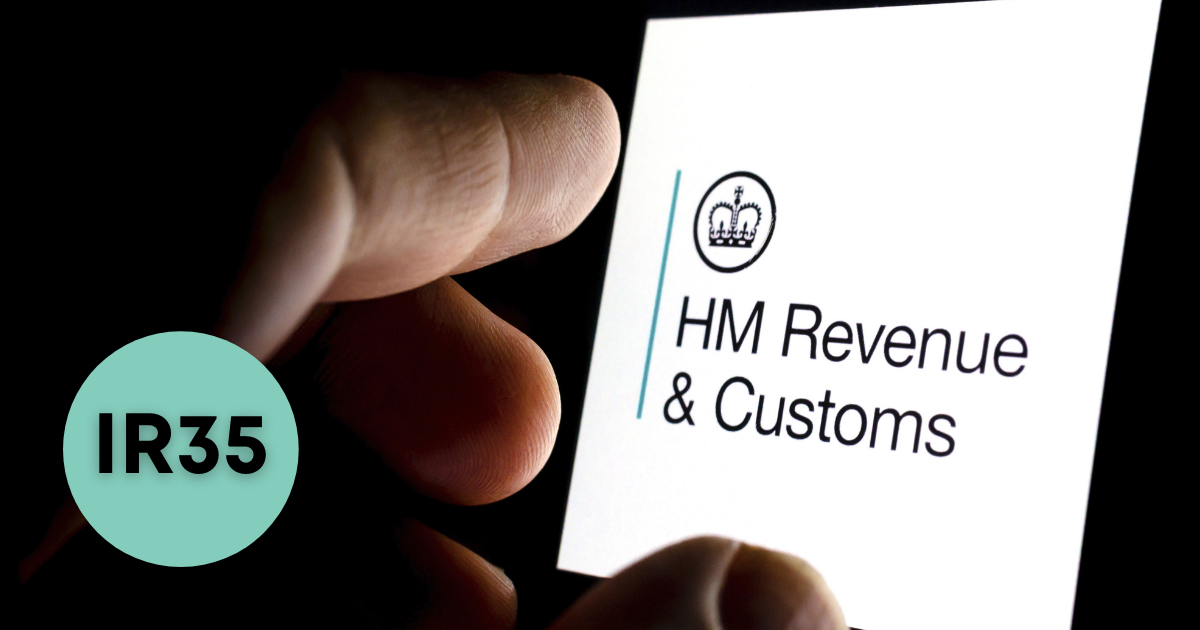IR35 Reforms: Be Prepared
HERE'S WHAT IT MEANS FOR OUR CLIENTS & DRIVERS
IR35


Update as of 27th September 2022:
As you may have seen, in Friday 23rd September’s mini-budget, the Chancellor announced the IR35 tax changes are to be repealed. We are keeping a close eye on emerging updates and will ensure we update both this page, and all of our clients accordingly with any further news.
What is IR35? The principal aim of the IR35 legislation was to prevent workers from setting up Limited Companies through which they saved tax and NI contributions whilst working, in effect, as an employee.
In 2018 the Government announced that the IR35 Reforms would be extended to the Private Sector, with an initial expectation that it would be rolled out in April 2019. This turned out to be too soon and too ambitious and the target date was quickly changed to April 2020. However, just 20 days before the new legislation was due to go live, the Government deferred implementation to April 2021, citing the effect of the COVID-19 pandemic on the UK economy as the reason for this last-minute decision.
In April 2020 the House of Lords published a highly critical report on IR35. In spite of this, in July 2020, an amended form of the IR35 legislation was formally accepted into the Finance Bill by Parliament, meaning that it is now extremely likely that it will be rolled out to the Private Sector in April 2021.
Even the most ardent critics of the legislation seem to have accepted the inevitable implementation this year, but that hasn’t stopped them requesting amendments, mainly focused on areas of ambiguity relating to white collar contractors.
There is much less ambiguity regarding the tax treatment of blue collar professionals, including LGV and commercial drivers. The HMRC CEST (Check Employment Status for Tax) tool consistently determines commercial drivers to be within the scope of IR35, i.e. they should be considered to be employees for tax purposes and should pay standard PAYE and NI contributions. This has been confirmed by the Office of the Traffic Commissioner, which reviewed the legislation in depth. In conclusion the Senior Traffic Commissioner, Richard Turfitt, included a section on “Employees” within his Statutory Guidance, in which he stated:
“In road haulage, it is rare for someone to be genuinely self-employed [a Ltd Company contractor] unless they are an Owner-Driver.”
If a haulage operator is deemed to have contravened the Traffic Commissioner’s Guidance, they risk being disciplined and could ultimately lose their Operator’s Licence. Reputable operators are therefore unlikely to determine that their agency LGV drivers fall outside of IR35 and will insist they be employed as PAYE workers, regardless of the cost implications.
WHAT THIS MEANS FOR OUR VALUED CLIENTS:
The effect of the IR35 reform is to force agency workers who previously operated as Ltd Companies to pay more tax and their agencies or end clients to pay Employer NI Contributions. If we were to keep the drivers’ net income the same, it would result in an increase in employment costs of 25% to the agency. This is clearly not sustainable and this cost increase must be absorbed somehow:
- The drivers could take a cut in their net income, though it is feared that if this is too severe many British nationals will give up LGV driving for a career, while continental European drivers will “vote with their feet” and seek employment on the continent, where net pay will be higher and they will be “closer to home”.
- The agencies could absorb some of the cost increase, but after decades of pressure from their haulage clients, their net profits are already razor thin, typically less than 2%, so they cannot tolerate much before being forced into insolvency.
- Lastly, the end client, the haulage operator could absorb some of the cost increase, but we already know that margins in the haulage sector are extremely tight and there is little room for manoeuvre.
Ultimately, the only option is to distribute the cost increase across all parties, with the risk that we exacerbate the LGV driver shortage, possibly push weaker agencies into administration, while hauliers reduce their margins further, while trying to pass on some of the cost to their end customers. If the LGV driver shortage becomes critical, market forces will push up LGV driver pay rates and the effect will be further costs to be passed on to the agencies and their haulage clients.
Small Companies:
If you are a Small Company (fewer than 50 employees and/or less than £10.2M turnover*) you will be exempt from the IR35 legislation and can continue to engage Ltd Company contractors directly or through agencies without any liability for their tax and other statutory payments. However, because the larger hauliers (who are not “Small Companies”) engage the majority of agency workers, it means that most agency drivers will be within scope of IR35. The number of Ltd Company agency drivers will therefore be vastly reduced making it difficult for Small Companies to find and retain the cheaper Ltd Company drivers.
Please refer to our updated IR35 White Paper for a full analysis of the impact of IR35 on the UK Haulage Sector.
We have also prepared a 7-Step IR35 Action Plan, which guides you through the steps you need to take to ensure you successfully navigate the transition in April this year.
Please feel free to contact us; we would like to chat with you about the options and how to best work together to mitigate the impact of this disruptive legislation.
WHAT THIS MEANS FOR OUR LOYAL DRIVERS:
If you are working through a Ltd Company you may continue to do so until the beginning of April 2021. Remember that, as a Director of your Ltd Company, you will remain responsible for paying your PAYE tax and National Insurance Contributions and you will be liable to HMRC for any underpayment.
As we approach April 2021, we will work closely with you to guide you through the decision on whether to transfer to PAYE and how to do this as cost-effectively and smoothly as possible.
If you transfer to PAYE, you will have two options, which have different benefits and disadvantages:
- Work through an Umbrella PAYE scheme
- Transfer to the Driver Require PAYE payroll
We only work with the best and most compliant Umbrella companies, all of whom are FCSA accredited (the industry “gold standard”) so you should have no concern that you will receive an excellent service and your taxes will be processed correctly.
We have prepared two information leaflets to guide you through this process:
In the meantime we are working hard to negotiate the best market pay rates for you.
Should you have any questions please contact your branch who are keen to help you through this process.
Our IR35 WHITE PAPER is available to download here
BE PREPARED FOR IR35

The rollout of IR35 to the Private Sector will come into effect on 6th April 2021 following a delay due to the Covid-19 pandemic. Our 7 Step Action plan is designed to help you understand the steps required to ensure that hauliers are properly prepared for the changes in legislation come April 2021. Our hope is that this process will create greater transparency across the sector, bringing hauliers and agencies towards closer partnerships.
IR35 FOR DRIVERS

If you are working through a Ltd Company you may continue to do so until the beginning of April 2021. Remember that, as a Director of your Ltd Company, you will remain responsible for paying your PAYE tax and National Insurance Contributions and you will be liable to HMRC for any underpayment.
As we approach April 2021, we will work closely with you to guide you through the decision on whether to transfer to PAYE and how to do this as cost-effectively and smoothly as possible.
If you transfer to PAYE, you will have two options, which have different benefits and disadvantages:
- Work through an Umbrella PAYE scheme
- Transfer to the Driver Require PAYE payroll
We only work with the best and most compliant Umbrella companies, all of whom are FCSA accredited (the industry “gold standard”) so you should have no concern that you will receive an excellent service and your taxes will be processed correctly.
We have prepared two information leaflets to guide you through this process:
In the meantime we are working hard to negotiate the best market pay rates for you.
Should you have any questions please contact your branch who are keen to help you through this process.
WHAT IS DRIVER REQUIRE DOING TO PREPARE FOR IR35?
- We have analysed the legislative changes from the perspective of haulage companies and have updated our focused White Paper to explain the implications for the haulage sector.
- We have prepared a clear and concise Action Plan for our clients.
- We have approached all of our clients to warn them of the impending changes and to offer support preparing for these.
- We have produced an explanatory leaflet for our drivers and we are actively working with them to help them understand the impact IR35 will have on them and what we are doing to get the best result for them.
- Driver Require is a member of the REC Driving Sector Group Executive Committee and, in this capacity, we are working with the other members of the Executive Committee to inform and support our members on how best to prepare for the implementation of IR35 legislation.
- Further to this, we are coordinating with the FCSA and have appealed to the government & regulatory bodies that if they insist on proceeding with this legislation, to robustly enforce it to avoid a proliferation of unethical and unscrupulous operators undermining the compliant value-adding agencies.
- We are raising awareness of this issue through various communication channels and have prepared an IR35 Action Plan for our clients. We are actively engaging with our clients to gain a better understanding of the challenges we will face and actions we collectively need to take to achieve the best outcome.
IR35, Brexit & The LGV Driver Shortage
What is IR35?
IR35, officially first known as the “Intermediaries Legislation”, was introduced in 1999 by Gordon Brown, then Chancellor of the Exchequer. It was implemented in the 2000 Finance Act and its current name comes from the Inland Revenue Press Release reference code, “IR35”, which released details of the new legislation to the public.
The principal aim of the legislation was to prevent workers from setting up Limited Companies through which they saved tax and NI contributions whilst working, in effect, as an employee.
The initial IR35 legislation was overly complex and was not successful in reducing tax avoidance because it placed the onus for tax compliance on the director of the Limited Company. This meant that, to enforce the legislation, HMRC had to legally pursue the individual Limited Company directors, which was impractical and costly. HMRC could not bring a Class Action or establish a legal precedent that could be generally applied because each case was considered to be unique. For this reason IR35 remained ineffective and workers continued to use the Ltd Company model to avoid tax and NI contributions with impunity.
In 2010 the Office of Tax Simplification reviewed IR35 and decided to overhaul the legislation. This started a process of gradual amendments which culminated in the IR35 Reforms implemented in the Public Sector in April 2017. These reforms changed one key aspect of the legislation, this being that the liability for underpaid tax was transferred from the Limited Company director to the recruitment agency or the end client. Given that the end clients were government bodies, they complied with the legislation and forced most of their Limited Company contractors to move to PAYE status.
In 2018 the Government announced that the IR35 Reforms would be extended to the Private Sector, with an initial expectation that it would be rolled out in April 2019. This turned out to be too soon and too ambitious and the target date was quickly changed to April 2020.
On 17th March 2020, 20 days before the new legislation was due to go live, the Government deferred implementation to April 2021, citing the effect of the COVID-19 pandemic on the UK economy as the reason for this last minute decision.
In April 2020 the House of Lords published a highly critical report on IR35. In spite of this, in July 2020, an amended form of the IR35 legislation was formally accepted into the Finance Bill by Parliament, meaning that it is now extremely likely that it will be rolled out to the Private Sector in April 2021.
Even the most ardent critics of the legislation seem to have accepted the inevitable implementation next year, but that hasn’t stopped them requesting amendments, mainly focused on areas of ambiguity relating to white collar contractors.
There is much less ambiguity regarding the tax treatment of blue collar professionals, including LGV and commercial drivers. The HMRC CEST (Check Employment Status for Tax) tool consistently determines commercial drivers to be within the scope of IR35, i.e. they should be considered to be employees for tax purposes and should pay standard PAYE and NI contributions. This has been confirmed by the Office of the Traffic Commissioner, which reviewed the legislation in depth. In conclusion the Senior Traffic Commissioner, Richard Turfitt, included a section on “Employees” within his Statutory Guidance, in which he stated:
“In road haulage, it is rare for someone to be genuinely self-employed [a Ltd Company contractor] unless they are an Owner-Driver.”
If a haulage operator is deemed to have contravened the Traffic Commissioner’s Guidance, they risk being disciplined and could ultimately lose their Operator’s Licence. Reputable operators are therefore unlikely to determine that their agency LGV drivers fall outside of IR35 and will insist they be employed as PAYE workers, regardless of the cost implications.


